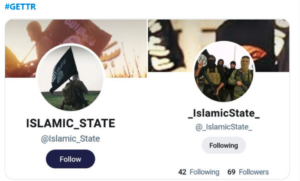
ISIL on Gettr
On 1st June 2021 former Trump administration official Jason Miller launched “Gettr” a pro Trump, pro “free speech” alternative to Twitter, aimed at conservative Americans. However, in the space of a few weeks, the platform has become a hotbed of radical Islamic propaganda. Pro ISIL accounts have been flooding the platform with posts including video of beheading and other extremist content. This fits with recent intelligence which shows a renewed surge of ISIL activity on closed platforms such as Telegram and WhatsApp, aimed at promoting their extremist agenda and targeting new recruits on social media. Chantelle Davis reports.
Despite losing, it’s billion-dollar operation, the loss of territorial grounds and a global pandemic, ISIL has become advanced in ‘undetectable’ social media recruitment techniques. However, their political objective remains the same – to achieve a transnational caliphate that has traits of old Islamic culture, but new ideologies based on their own political and governing laws; better known as ‘wilayat’. ISIL and its supporters are pursuing its political goals through propaganda campaigns targeting its hatred towards Western Governments and society. Unquestionably, ISIL is fixated on its strategy to establish a new political system within the territories it occupies, enforced by terror and threats those ISIL deem non-supporters or ‘kuffars’, but during the pandemic ISIL has strengthened its presence in online spaces to a degree not witnessed before has. Researchers are concerned about the impact that this might bring to counter-terrorism, as these methods are far harder to detect (particularly on closed social networks), allowing recruitment and online radicalization to occur away from prying eyes. To examine the extent to which ISIL has the potential to sway the majority of jihadism, it is important to examine where the terrorist organization has stood and fallen over the years, with a close look at the online strategies they’ve utilized.
ISIL’ Territorial Fall
2015: Despite collapsing in 2014, ISIL became at its peak by 2015 with regards to territory and group following – offline and online. Reporters describe 2015 as the period for ISIL where they became a greater threat than Al-Qaeda.
2017: By 2017 ISIL had lost 95 per cent of their territory, but remained a threat in mainly Syria and Iraq. After two years of growth across online forums, ISIL became infamous by posting video content of beheadings and slaughtering. As ISIL’s geo political strength shrank, counter-terrorism experts became deeply concerned as a wave of ISIL inspired stochastic terrorist attacks swept through Europe, carried out by young Muslims radicalized by ISIL’s effective online propaganda campaign.
2018: ISIL were described as knowledgeable of social media and made such a presence that invited numerous online affiliates who further represent the group and its cause.
2019: ISIL loses control of its final territory in Syria, which indicates that the terrorist group was defeated on the ground at least. ISIL became reliant on its online supporters and utilizes social media to its full extent in regard to recruitment and keeping its “brand” alive.
ISIL’ Modern Social Media Strategy
Research suggests that the terrorist organization ISIL most prominently use social media platforms Twitter, Facebook, Telegram and WhatsApp. The primary focus on these apps has always been networking for ISIL, though, with unique features and tools each prepares a different strategy:
Twitter – Gain following and presence through short, meaningful content (tweets) that relates to its readers.
Facebook – Make use of the worldwide networking opportunities (messenger) and employ propaganda that appeals to every generation.
Telegram and WhatsApp – Exploit the encrypted messaging service of these apps and use them primarily for private discussions and its end goal: recruitment.
But what part does social media play in ISIL’s overall political objectives? Simons proposes that it is the group’s method of ‘political marketing’ to build upon their influence, credibility, and operational capabilities. It works to heighten ISIL’s relationships and appearance via propaganda, which sells the ‘dream’ and is appealing to vulnerable people. ISIL effectively utilizes multiple strategies on an array of platforms in a complex campaign to entice and manipulate individuals to join the path of jihad – recruitment – all to progress ISIL’s dream of a transnational caliphate.
COVID-19 Impact
Fortunately, ISIL has been disrupted in their plans for violence as mass gatherings and travellers were restricted due to the global pandemic that hit 2019. This has prevented the group and its supporters from advocating their beliefs and deadly actions, but also stemmed the tide of new recruits from travelling to the Middle East to join ISIL camps. Although this is an obvious advantage for counter-terrorism, these agencies have also been negatively impacted by COVID-19 via budget cuts as Governments pivoted resources to fighting the pandemic. The likely result is that ISIL is well placed to take full advantage and may launch a resurgence as pandemic restrictions come to an end. It seems to be already in progress, as researchers fear that ISIL is re-surging in Syria emboldened by the renewed Taliban campaign in Afghanistan.
Will ISIL Rise Again in 2021?
There will always be an Islamic State Terrorist Organization that threatens Western society, whether it flourishes in a group dynamic, lone-wolf actors or modern online affiliates. Likewise, while technology enhances ISIL, it means they must adapt and change its operations to maintain its image and not fall behind in today’s reality. A social media strategy for recruitment and expanding its popularity is cheaper, quicker and offers a wide-spread audience – so why wouldn’t they follow? Counter-terrorism initiatives should recognize this and design improved technological methods of removing terrorist propaganda more efficiently (i.e. faster machine learning), but also to limit their presence on both open platforms and closed social networking apps. As ISIL’s geopolitical strength and geographical base collapsed , social media has become the inevitable solution for its chance at success.
